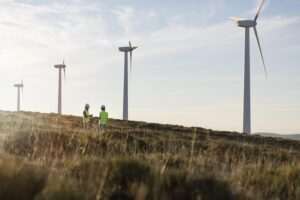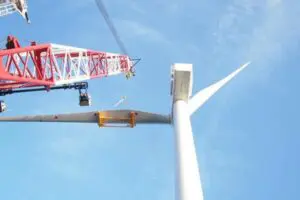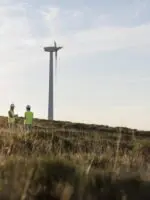Coal is not the answer to the maintaining an affordable and reliable electricity supply, and a national energy policy must be paired with a price on carbon emissions and incentives for flexible generation, the CEO of Origin Energy Frank Calabria has told a meeting of business leaders in Sydney.
Speaking at an event hosted by CEDA, Calabria said coal will not be the solution to Australia’s long term challenges in the energy sector, and that the answer to the growing share of wind and solar instead rests with incentivising truly flexible supplies of electricity, including gas generation, pumped hydro and battery storage.
Calabria said the current design of the National Electricity Market was not supporting investment focused on the long term needs of consumers, including reliability and price while reducing emissions. Calabria added that this had been made worse by ongoing policy uncertainty.
“It is very hard to argue the NEM is working well right now with prices and reliability a real concern each summer,” Calabria said.
“A decade of policy inertia, including failed attempts at major energy and climate policy reform and market design, has made it very difficult for a board to commit capital investment on long-dated assets of 20 to 30 years or more into such an uncertain market, where the rules could change at any time.”
Calabria said that there needs to be a greater focus on incentivising investment in new firming capacity, especially from low-emissions flexible generators, adding that coal is not best placed to deliver this.
Origin owns the country’s biggest coal fired generator, Eraring in NSW, but has vowed to close this by 2032.
Calabria said new investment in flexible generation is required, as solar and wind is already pushing coal out of the market, as the renewable technologies are able to deliver electricity at a lower cost.
“We need to recognise that coal is the wrong type of generation to firm renewables and extending the life of old coal plants without a strong carbon signal will extend the uncertainty we are all facing today,” Calabria said.
“While denying the inevitability of the low emissions future we know we will need to deliver for our customers and the community if we are to minimise the impacts of climate change.”
In his speech, Calabria said that it was likely that a mix of policy mechanisms will be needed to steer investment in new electricity infrastructure, and that no single mechanism will act as a ‘panacea’.
With parallels to the warning delivered to the All Energy conference earlier this week by Tempus Energy CEO Sara Bell, that capacity markets act as an effective subsidy to fossil fuel generators, Calabria suggested that to incentivise the right form of generation, any capacity market proposal must be paired with a price on carbon emissions.
“It is important that capacity markets aren’t viewed as a panacea – some have been plagued with issues, such as in the UK,” Calabria said.
“We would argue that any capacity payments need to go hand-in-hand with a strong carbon signal, to minimise distortion in the market, deferring further investments and increasing the costs to customers.”
“I believe agreement on an overarching, market mechanism that effectively coordinates the massive amount of activity that’s happening in the market right now will help to deliver a cleaner, smarter transition in energy at the lowest cost to consumers– and given energy is central to every aspect of our economy, is in the best interests of all stakeholders,” Calabria added.
Calabria indicated that Origin’s preference would be for the introduction of a carbon price on the electricity sector based on emissions intensity. Such a policy would penalise the most emissions intensive generators, generally coal, while encouraging renewables and having minimal impact on gas generation.
While Origin operates the coal-fired Eraring power station, it also operates a large portfolio of gas generation, as well as substantial investments in gas production facilities.
Responding to suggestions from federal resources minister Matt Canavan that the government should do the opposite of what the big energy companies recommend on energy policy and “build coal”, Calabria said that he remained focused on improving outcomes for customers while lowering emissions.
“I am certainty very much focused on the future the industry needs to invest into, we have done that over a long period of time and continue to focus on it. I am very much focused on the future sector, reducing emissions and improving affordability,” Calabria said.
I reckon we should do the opposite of what the big energy companies say because they are a big reason why we are in this mess. They have no interest in ending a mess that they make lots of money out of. So let's build coal!
— Senator Matt Canavan (@mattjcan) October 24, 2019
Earlier this month, the Origin Energy board faced fired up shareholders at its Annual General Meeting in Sydney. The company has faced calls to abandon its plans for the Beetaloo Basin project, which is set to massively expand the extraction of gas in the Northern Territory, and would involve fracking across an area of 18,500 square kilometres of land south-east of Katherine.
Opposition has come from both environmental campaigners, as well as a group of Aboriginal traditional owners from the region, concerned about the potential impacts of fracking on the land.
Ahead of the AGM, Origin Energy released a valuation of its generation portfolio under the different Paris Agreement scenarios of 1.5 or 2 degrees of global warming. Under each scenario, Origin found the value of its lower emissions generators, consisting of solar, wind and gas, would increase in value as demand for low emissions generation increased.
Origin Energy operates Australia’s largest coal-fired generator, the 2,880MW Eraring power station, which the company assessed as declining in value under the Paris global warming scenarios, but would remain viable to operate Eraring until its scheduled closure in 2032.










